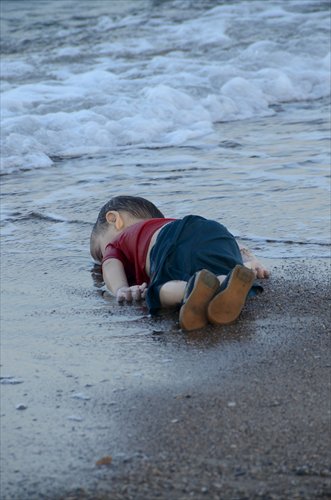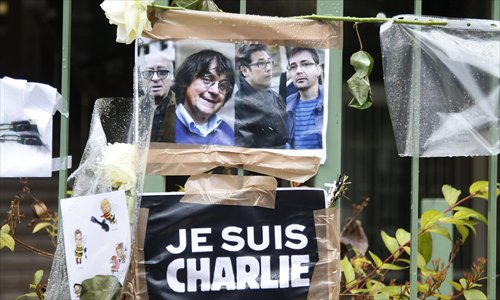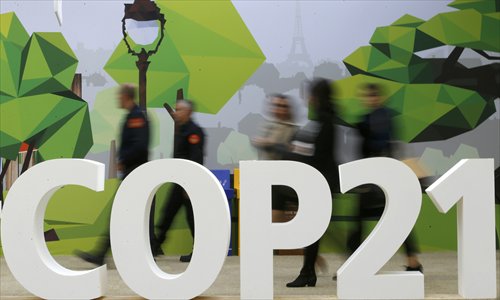HOME >> WORLD
A hard year: 2015’s stories
Source:Global Times Published: 2015-12-29 21:18:01
Refugees, terror top headlines
This year saw a grim range of stories top headlines, from terrorist attacks across the world to the faces of stranded or drowned refugees. But there was also hope, as leaders came together to sign climate deals or put aside rivalries. The Global Times gathered 10 stories (in chronological order) that affected everyone.

1. IS threat goes global
In January, gunmen attacked the French satirical magazine Charlie Hedbo's central office in Paris, leaving 12 people dead. On November 13, eight IS militants launched a string of terror attacks on Paris again, claiming at least 130 lives, and shocking the world. In early December, a radicalized married couple massacred 14 people at a social service center in San Bernardino, California.
2. Hong Kong reform plan
On April 22, Hong Kong Special Administrative Region government published the electoral reform plan. The package of proposals abided by the Basic Law of the Hong Kong Special Administrative Region and within a framework issued by the Standing Committee of the National People's Congress on August 31 last year. On June 18, the Legislative Council vetoed the reform plan, meaning no elections next year. The NPC condemned opposition lawmakers for insisting on their stubborn confrontation with the central authorities, which they said impeded the development of Hong Kong's democracy.
3. Big financial changes
The AIIB (Asian Infrastructure Investment Bank) was proposed as an initiative by China and supported by 37 regional and 20 non-regional prospective founding members. The article of agreement was signed on June 29, with China, India, Russia, Germany, South Korea and Australia are the major stakeholders. On November 30, the International Monetary Fund put RMB into the SDR, making China's currency the fifth to enter SDR after US dollar, Japanese yen, Euro and British sterling.
4. Accidents shock China
On the evening of August 12, a huge explosion of dangerous chemicals happened in Tianjin, with warehouses and factories as well as nearby residence heavily damaged. It killed 165, including 99 firefighters. At the beginning of the year, a stampede in Shanghai killed 35 and injured 42. On June 1, the Oriental Star passenger vessel was shipwrecked in Yangtze River in Jianli of Hubei Province, with 12 people rescued but 442 killed, the worst shipwreck incident on inland river since 1949. In late December, a landslide that left more than 70 missing in Shenzhen, Guangdong Province was ruled to be a work safety incident rather than a natural disaster, the State Council investigation team said, after the collapse of a waste pile heap.
5. Drowned toddler
On September 2, the picture of a 3-year-old Syrian boy's body that had washed ashore on a Turkish beach spread widely. More than 1 million migrants reached Europe this year, mainly those fleeing war in Afghanistan, Iraq and Syria. They try to reach the West Europe via route from Turkey, Greece and the Balkans. Countries including Austria, Germany and Hungary re-introduced border controls within the Schengen passport-free zone. The quotas system within the European Union for distributing refugees raised a divisive debate, making spaces for the anti-immigration political parties. The EU formed a plan to relocate asylum seekers but encountered opposition from some countries unwilling to shoulder their share.
6. Wartime anniversaries
The year of 2015 marked the 70th anniversary of victory in the World Anti-Fascist War. On May 8, events were held in Western European countries to commemorate the V-day. One day later, Russia staged its biggest ever celebrations of the anniversary of the Red Army's triumph over Nazi German in 1945 with more than 150 cities joining in the celebrations and military parade. On September 3, China held a grand military parade at Tiananmen Square, Beijing to mark the 70th anniversary of the victory of the Chinese People's War of Resistance Against Japanese Aggression and the World Anti-Fascist War.
7. Japan's security law
The Japanese Diet passed the new security law on September 19, despite strong disapproval from the opposition parties and public opposition. It shows Japan taking a major shift on its "defensive" security policy. On September 30, the Japanese government published the new security law, which allows Japan to exercise collective self-defense. The law will be put into effect in March. Opposition parties and many constitutional scholars are against the law, saying it violates Japan's constitution. Japanese media polls showed more than half of the public are against the law.
8. Russian planes downed
A month after Russia launched its airstrikes on enemies of Syrian leader Bashar al-Assad, including IS militants, on September 30, a Russian airliner was downed in the Sinai Peninsular, while the IS claimed responsibility in killing the 224 on board. At the end of November, a Russian Su-24 jet was shot down by a Turkish F-16, with Ankara saying the Russian fighter invaded Turkey's airspace. One pilot was killed by militants while ejecting. Russian President Vladimir Putin said the incident was a "stab in the back" and Russian-Turkish relations hit a new low.
9. First Xi-Ma meeting
On November 7, President Xi Jinping and Taiwan leader Ma Ying-jeou exchanged a handshake in the historic meeting at the Shangri-La Hotel in Singapore since 1949. They reaffirmed the 1992 Consensus during the meeting which was seen as a breakthrough in cross-Straits relations and as a solidification of a common political basis through peaceful development.
10. Paris climate deal
After two weeks of negotiation at the Paris climate change conference, the parties reached an agreement on reducing carbon dioxide production from 2020. The expected key result was an agreement to set a goal of limiting global warming to less than 2 C compared to pre-industrial levels. The Paris conference chief and France's Foreign Minister Laurent Fabius said the agreement is an "ambitious and balanced" plan and was a "historic turning point" in the goal of reducing global warming.



A young migrant, who drowned in a failed attempt to sail to the Greek island of Kos, lies on the shore in the Turkish coastal town of Bodrum, Turkey, on September 2.
1. IS threat goes global
In January, gunmen attacked the French satirical magazine Charlie Hedbo's central office in Paris, leaving 12 people dead. On November 13, eight IS militants launched a string of terror attacks on Paris again, claiming at least 130 lives, and shocking the world. In early December, a radicalized married couple massacred 14 people at a social service center in San Bernardino, California.
2. Hong Kong reform plan
On April 22, Hong Kong Special Administrative Region government published the electoral reform plan. The package of proposals abided by the Basic Law of the Hong Kong Special Administrative Region and within a framework issued by the Standing Committee of the National People's Congress on August 31 last year. On June 18, the Legislative Council vetoed the reform plan, meaning no elections next year. The NPC condemned opposition lawmakers for insisting on their stubborn confrontation with the central authorities, which they said impeded the development of Hong Kong's democracy.
3. Big financial changes
The AIIB (Asian Infrastructure Investment Bank) was proposed as an initiative by China and supported by 37 regional and 20 non-regional prospective founding members. The article of agreement was signed on June 29, with China, India, Russia, Germany, South Korea and Australia are the major stakeholders. On November 30, the International Monetary Fund put RMB into the SDR, making China's currency the fifth to enter SDR after US dollar, Japanese yen, Euro and British sterling.
4. Accidents shock China
On the evening of August 12, a huge explosion of dangerous chemicals happened in Tianjin, with warehouses and factories as well as nearby residence heavily damaged. It killed 165, including 99 firefighters. At the beginning of the year, a stampede in Shanghai killed 35 and injured 42. On June 1, the Oriental Star passenger vessel was shipwrecked in Yangtze River in Jianli of Hubei Province, with 12 people rescued but 442 killed, the worst shipwreck incident on inland river since 1949. In late December, a landslide that left more than 70 missing in Shenzhen, Guangdong Province was ruled to be a work safety incident rather than a natural disaster, the State Council investigation team said, after the collapse of a waste pile heap.
5. Drowned toddler
On September 2, the picture of a 3-year-old Syrian boy's body that had washed ashore on a Turkish beach spread widely. More than 1 million migrants reached Europe this year, mainly those fleeing war in Afghanistan, Iraq and Syria. They try to reach the West Europe via route from Turkey, Greece and the Balkans. Countries including Austria, Germany and Hungary re-introduced border controls within the Schengen passport-free zone. The quotas system within the European Union for distributing refugees raised a divisive debate, making spaces for the anti-immigration political parties. The EU formed a plan to relocate asylum seekers but encountered opposition from some countries unwilling to shoulder their share.
6. Wartime anniversaries
The year of 2015 marked the 70th anniversary of victory in the World Anti-Fascist War. On May 8, events were held in Western European countries to commemorate the V-day. One day later, Russia staged its biggest ever celebrations of the anniversary of the Red Army's triumph over Nazi German in 1945 with more than 150 cities joining in the celebrations and military parade. On September 3, China held a grand military parade at Tiananmen Square, Beijing to mark the 70th anniversary of the victory of the Chinese People's War of Resistance Against Japanese Aggression and the World Anti-Fascist War.
7. Japan's security law
The Japanese Diet passed the new security law on September 19, despite strong disapproval from the opposition parties and public opposition. It shows Japan taking a major shift on its "defensive" security policy. On September 30, the Japanese government published the new security law, which allows Japan to exercise collective self-defense. The law will be put into effect in March. Opposition parties and many constitutional scholars are against the law, saying it violates Japan's constitution. Japanese media polls showed more than half of the public are against the law.
8. Russian planes downed
A month after Russia launched its airstrikes on enemies of Syrian leader Bashar al-Assad, including IS militants, on September 30, a Russian airliner was downed in the Sinai Peninsular, while the IS claimed responsibility in killing the 224 on board. At the end of November, a Russian Su-24 jet was shot down by a Turkish F-16, with Ankara saying the Russian fighter invaded Turkey's airspace. One pilot was killed by militants while ejecting. Russian President Vladimir Putin said the incident was a "stab in the back" and Russian-Turkish relations hit a new low.
9. First Xi-Ma meeting
On November 7, President Xi Jinping and Taiwan leader Ma Ying-jeou exchanged a handshake in the historic meeting at the Shangri-La Hotel in Singapore since 1949. They reaffirmed the 1992 Consensus during the meeting which was seen as a breakthrough in cross-Straits relations and as a solidification of a common political basis through peaceful development.
10. Paris climate deal
After two weeks of negotiation at the Paris climate change conference, the parties reached an agreement on reducing carbon dioxide production from 2020. The expected key result was an agreement to set a goal of limiting global warming to less than 2 C compared to pre-industrial levels. The Paris conference chief and France's Foreign Minister Laurent Fabius said the agreement is an "ambitious and balanced" plan and was a "historic turning point" in the goal of reducing global warming.

Pictures of cartoonists and a placard that reads "I am Charlie" are displayed at the Paris offices of Charlie Hebdo in Paris, on January 9.

People walk past the COP21 logo in the Climate Generations area during the World Climate Change Conference 2015 (COP21) at Le Bourget, near Paris, on December 1. Photos: CFP
Posted in: Cross-Borders